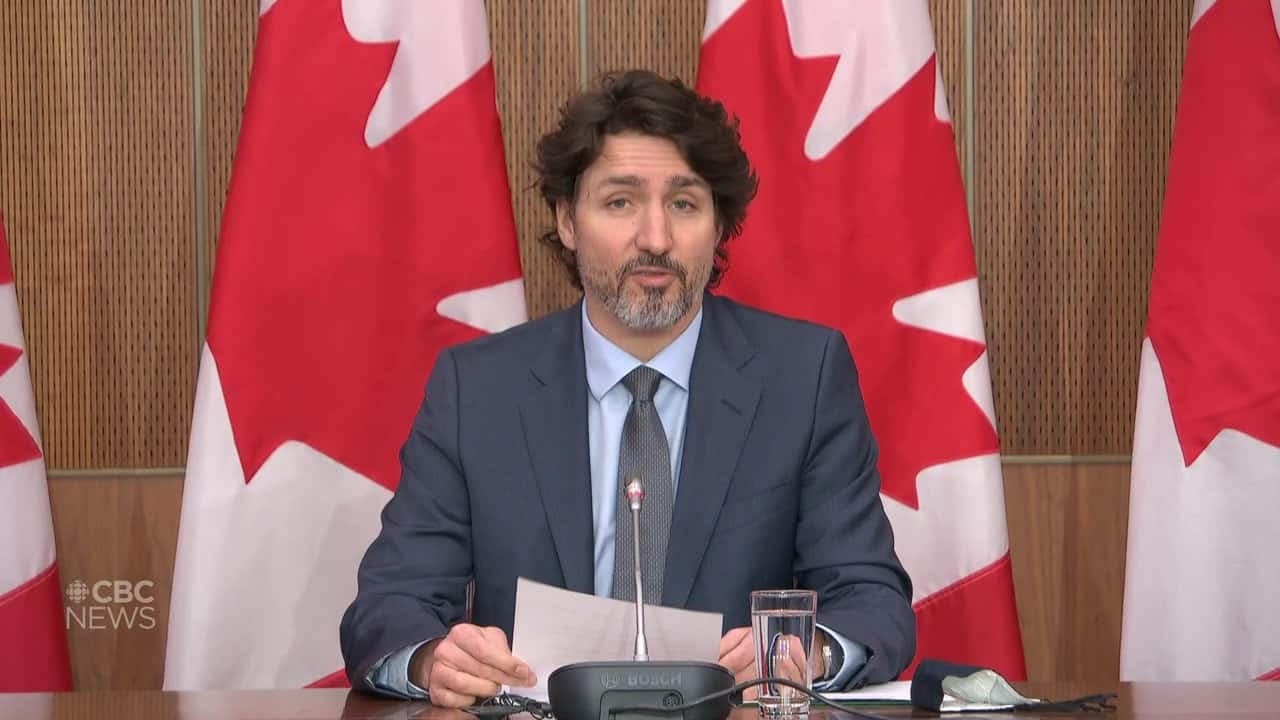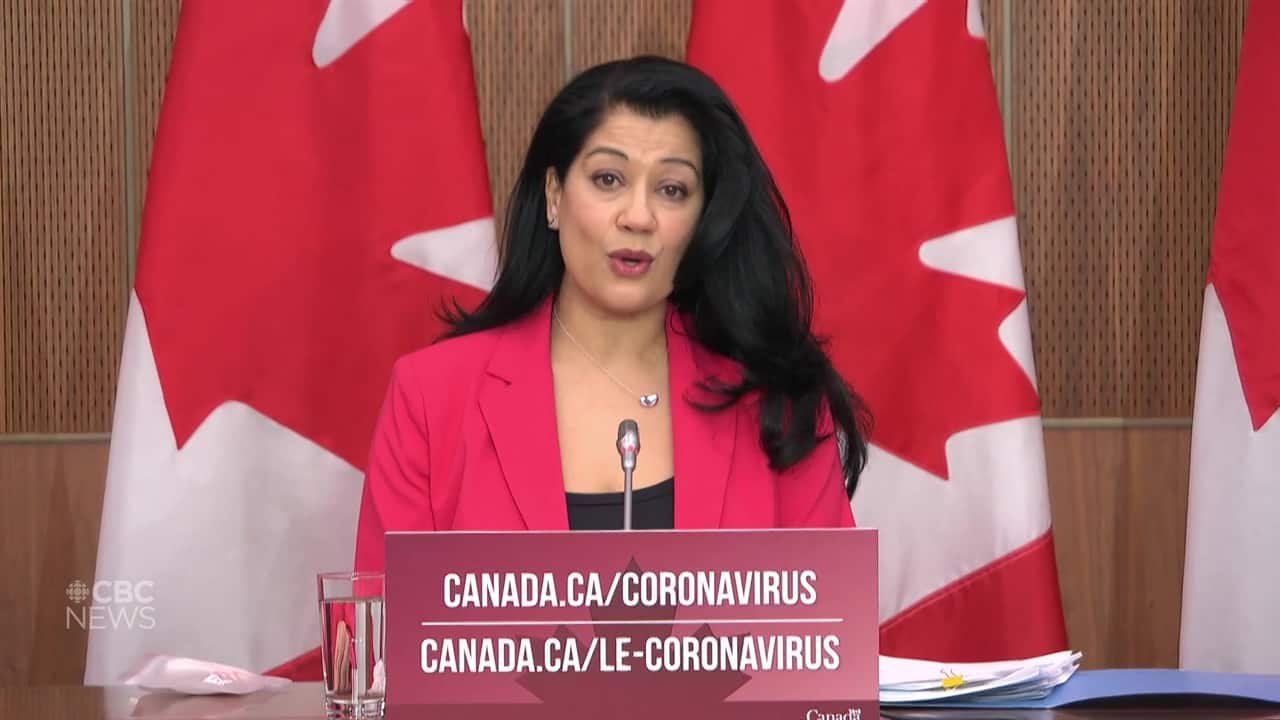Canada’s national campaign to inoculate people against the novel coronavirus got good news on two fronts today: one vaccine maker now plans to accelerate its deliveries and federal regulators have cleared a fourth COVID-19 vaccine for use in this country.

Canada’s national campaign to inoculate people against the novel coronavirus got good news on two fronts today: one vaccine maker now plans to accelerate its deliveries and federal regulators have cleared a fourth COVID-19 vaccine for use in this country.
Prime Minister Justin Trudeau said today that, after negotiations with the federal government, vaccine manufacturer Pfizer has agreed to move up delivery of 3.5 million doses of its COVID-19 vaccine — originally scheduled to arrive in the summer — to the next three months.
The company will deliver an additional 1.5 million doses in March, one million more doses in April and another million in May, Trudeau said, bringing the total number of doses of all approved vaccines expected to arrive by the end of this month to 8 million.
The announcement came just hours after Health Canada approved the use of Johnson & Johnson’s COVID-19 vaccine in Canada, providing provinces and territories with another vaccine in addition to those previously approved from Pfizer-BioNTech, Moderna and AstraZeneca-Oxford.
A second version of the AstraZeneca-Oxford vaccine that is biologically identical but manufactured under different conditions by the Serum Institute of India under the brand name “Covishield” has also been authorized.
The Johnson & Johnson vaccine, produced by the U.S. health care giant’s pharmaceutical subsidiary, Janssen Inc., is widely seen as one of the easiest to distribute because it requires only one dose and can be stored for long periods of time at regular refrigerator temperatures of 2 C to 8 C.
“As long as it takes, we’ll be there with what people need to get through this pandemic. That means we’re sending more and more vaccines to the provinces and territories in the coming weeks and months,” Trudeau told a press conference today.
The new Pfizer delivery schedule and the Johnson & Johnson approval are expected to accelerate Canada’s vaccine rollout, which has so far lagged behind dozens of other countries that have vaccinated more people per capita.
WATCH | Trudeau announces more Pfizer COVID-19 vaccines are heading to Canada

Prime Minister Justin Trudeau says Pfizer will be delivering an additional 1.5 million doses to Canada in March. 1:00
Johnson & Johnson safe and effective: Health Canada
In approving the Johnson & Johnson vaccine, Health Canada’s chief medical adviser said a review of data from a clinical trial involving more than 44,000 participants found the shot is safe and effective.
“As with all COVID-19 vaccines, Health Canada authorized the Janssen one after an independent and thorough scientific review for safety, efficacy and quality,” said Dr. Supriya Sharma.
“After assessing all the data, we concluded there was strong evidence that showed the benefits of this vaccine outweigh the potential risks.”
WATCH | Public health officials announce the approval of Johnson & Johnson’s COVID-19 vaccine in Canada

Dr. Supriya Sharma, Health Canada’s chief medical adviser, announces the approval of Johnson & Johnson’s COVID-19 vaccine in Canada. 1:51
Health Canada concluded the vaccine has an efficacy rate of 66.9 per cent in preventing moderate to severe COVID-19 illness, and has authorized it for use for adults aged 18 and older.
While the vaccine is less effective than previously approved vaccines from Pfizer-BioNTech and Moderna — both of which had efficacy rates of 90 per cent and above — Sharma said the shot offers strong protection against the threats that matter most: serious illness, hospitalizations and death.
“The efficacy rate does not mean that following vaccination with a vaccine with 66 per cent efficacy, that you will have a 34 per cent chance of contracting COVID-19,” said Sharma.
“While each of the vaccines Health Canada has authorized has different efficacy numbers, the reality is that you will have a greatly reduced chance of getting COVID-19 with any of the … vaccines that have been authorized.”
Sharma said the shot remained effective against the coronavirus variants first identified in South Africa and Brazil, as well as the dominant strains circulating in the U.S. and Canada.
Clinical trials are also underway for other vaccines to see how safe they are for children between the ages of 12 and 17, but Sharma suggested it will be months yet before they’re able to get the shots.

Delivery schedule firming up
Canada has ordered 10 million doses from Johnson & Johnson, with options for up to 28 million more.
While there is no timeline for their delivery just yet, Trudeau said the president of Janssen Canada, Jorge Bartolome, assured him this morning that the company is working to set up its global supply chains and plans to meet its delivery commitments.
Health Canada has provided authorizations for manufacturing at two facilities — one in the U.S. and one in Europe — but it’s unclear right now from where Canada’s doses will be shipped.
Procurement Minister Anita Anand said that the Johnson & Johnson doses aren’t expected to begin arriving until April, although the full order of 10 million should be delivered by September.
WATCH | Dr. Sharma addresses vaccine hesitancy

Health Canada’s Chief Medical Adviser Dr. Supriya Sharma says the process to approve vaccines in Canada “is based solely on science and evidence and grounded by regulation.” 1:50
Canada now expects to receive 36.5 million doses of the Pfizer-BioNTech, Moderna, AstraZeneca-Oxford and the Covishield vaccines by the end of June. By the end of September, Canada will have received 117.9 million doses.
The June number will grow once delivery schedules for the 20 million doses on order from AstraZeneca and the 10 million from Johnson and Johnson are confirmed, Anand said.
“Because of our diversified procurement, we are able to see an acceleration in doses coming to Canada from multiple suppliers,” said Anand.
Pfizer’s accelerated delivery schedule comes after major delays in January and February, when the company upgraded its production lines at a major factory in Belgium.
Production problems also slowed the initial rollout of the Johnson & Johnson vaccine in the U.S. after that country approved it in February. The country was supposed to receive 10 million doses as soon as the vaccine was approved, but only four million doses were shipped out March 1.
The U.S. expects to get another 16 million doses by the end of March and 100 million total by the end of June.
Only one vaccine is still under review by Health Canada — the Novavax product. Sharma said a decision on whether it can be used in Canada is weeks or months away.
